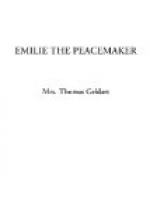Mrs. Crosse was extremely polite; and in the bustle of greeting, and putting up the pony, and aunt Agnes’ questions, the fire-work affair was almost forgotten. When they all met at tea, the farmer, who had almost as great a horror of gunpowder as Mr. Parker—and in the vicinity of barns and stacks, with greater reason—declared he smelt a smell which he never tolerated in his house, and asked his boys if they had any about them. They denied it, but it was evident they knew something of the matter; and now Emilie’s concern was very great.
After tea she took John by the arm, and looking into his face, said, “I am going to be very intrusive, Sir; I am not your governess, and I have no right to control you, but I wish to be your friend, and may I advise you? Don’t take those fire-works out on Mr. Crosse’s premises, you have no idea the mischief you might do. You could not have brought them to a worse place. Be persuaded, pray do, to give it up.” John, thus appealed to, laughed heartily at Miss Schomberg’s fears, said something not very complimentary about Miss S. speaking one word for the farmer’s stack, and two for her own nerves, and made his escape to join his brother, and the two young farmers, who were delighted at the prospect of a frolic.
What was to be done? The lads were gone out, and doubtless would send up their rockets and let off their squibs somewhere on the farm, which was a very extensive one. The very idea of fire-works would put aunt Agnes into a terrible state of alarm, so Emilie held her peace. To tell the farmer would, she knew, irritate him fearfully; and yet no time was to be lost. She was older than any of the party, and it was in reliance on her discretion that the visit had been permitted. She appealed to Edith, but Edith, who either had a little fancy to see the fire-works, or, who feared her brothers’ ridicule, or who thought Emilie took too much upon herself, gave her no help in the matter.
“Well, Edith,” said Emilie, when the farmer’s wife left the room to make some preparation for a sumptuous supper, “I have made up my mind what to do. I will not stay here if your brothers are to run any foolish risks with those fire-works. I will go home at once, and tell your papa, he will be in time to stop it; or I will apprise Mr. Crosse, and he can take what steps he pleases.”
“Well, you will have a fine life of it, Miss Schomberg, if you tell any tales, I can tell you,” said Edith, pettishly, “and it really is no business of yours. They are not under your care if I am. Oh, let them be. Fred said he should let them off on the Langdale hills, far enough away from the farm.”
But Emilie was firm. She tied on her bonnet, and determined to make one more effort—it should be with Fred this time. She followed the track of the lads, having first inquired of a farm-boy which road they had taken, and as they had loitered, and she walked very fast, she soon overtook them. They were seated on a bank by the road-side, when she got up to them, and John was just displaying his treasures, squibs to make Miss Edith jump, Catherine wheels, roman candles, sky-rockets, and blue lights and crackers. The farmer’s sons, Jerry and Tom, grinned delightedly. Emilie stood for a few moments irresolute; the boys were rude, and looked so daring—what should she say?




